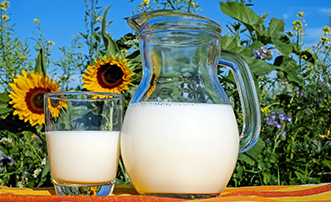Have you noticed the many milk alternatives at the grocery store? Milk alternatives are great for people who are avoiding animal products or dairy, watching calories, or simply wanting to try something new. Sometimes it can be overwhelming to know which milk is best for you. Here are some common milks you may find walking down the dairy aisle and what you can expect or look for as you browse.
Cow’s Milk
• Naturally rich in calcium and potassium
• Fortified with vitamin D
• High in protein (8 grams of protein per cup)
• Option of whole, 2%, 1%, or skim
Soy Milk
• Good alternative for those who are lactose intolerant or vegan
• 6 – 8 grams of protein per cup
• Fortified with calcium and vitamin D
• Look for unsweetened varieties to keep calories, carbs, and sugars low
Almond Milk
• Made of almonds and water
• Watery, loose texture with a nutty flavor
• Great addition to foods like oatmeal and smoothies
• Unsweetened versions are low in calories
• Contains almost no protein
Oat Milk
• Mild, nutty flavor with a smooth, creamy texture
• Great addition to coffee drinks, cereal, and other breakfast foods
• Moderate protein, higher in carbs and includes fiber
• If you need gluten-free foods, make sure the oats are gluten-free
Hemp Milk
• Made of hemp seeds and water
• Earthy, grassy taste
• Moderate protein (more than almond milk but less than soy milk)
• Great source of plant-based omega-3s
• Fortified with calcium and vitamin D
• Naturally free of soy, lactose, and gluten
Banana Milk
• Smooth texture with a banana flavor
• Contains no dairy or nuts
• Some brands are fortified with calcium and vitamin D
• Check ingredients and opt for an unsweetened version
Source: Today.com




